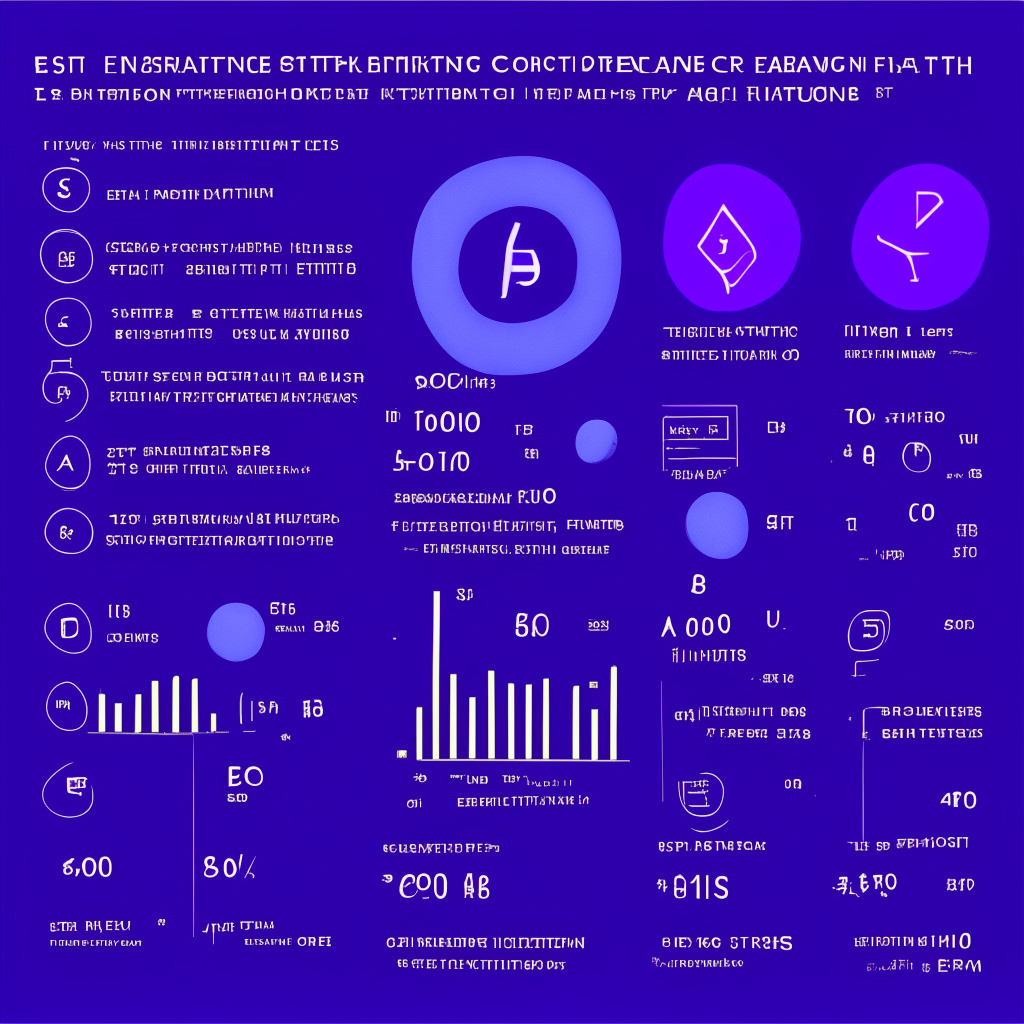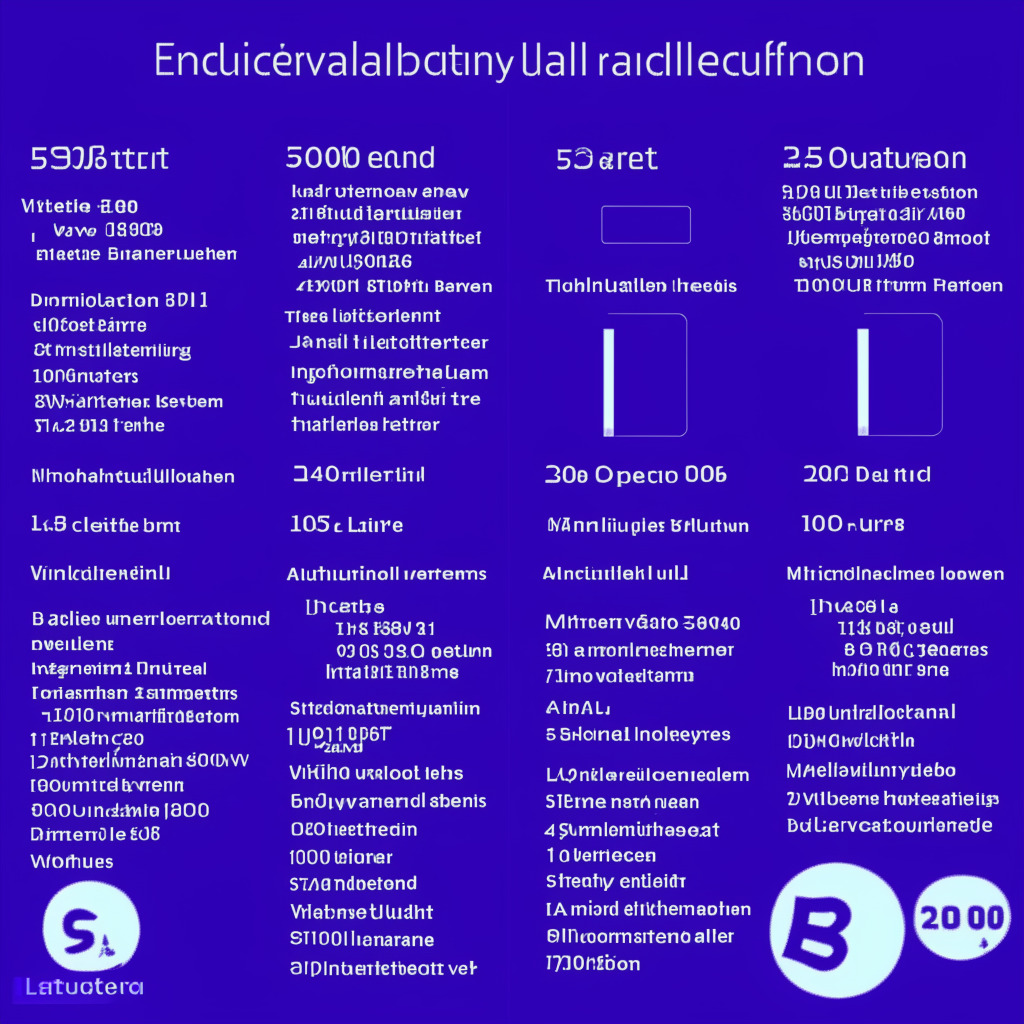Storage proofs, a cryptographic method aiming to revolutionize cross-chain asset transfers, may provide a more secure alternative to vulnerable bridges in the growing blockchain ecosystem. Starknet plans to be the first network to natively integrate storage proofs, potentially eliminating intermediary third-party “oracles,” offering enhanced security and user experience for asset transfers.
Search Results for: Proof of Work
Ethereum Validator Limit Debate: Balancing Network Growth and Security
Ethereum developers are considering a proposal to raise the validator limit from 32 ether to 2,048 ether (6,300% increase) as the demand for validator nodes surges. Validators play a critical role in maintaining the network’s security on proof-of-stake blockchains like Ethereum. The community and developers must weigh the potential impact of this change to strike a balance between users’ needs and maintaining the network’s integrity and safety.
Celsius Network’s ETH Staking Strategy Lengthens Queue for New Ethereum Validators
Celsius Network’s recent changes to its ETH staking strategy have exacerbated the already long queue for activating new validators on the Ethereum network. The company’s transfers have stretched the queue for establishing new validators now to 44 days, potentially adding almost an additional week due to Celsius actions.
Tron’s Multisig Vulnerability: Assessing the Network’s Security and $500 Million at Stake
A critical zero-day vulnerability in the Tron network’s multisignature mechanism was discovered by dWallet Labs, affecting over $500 million worth of digital assets. The flaw, which allows unauthorized transactions, raises questions about Tron’s reliability and security, but the prompt patch deployment is a positive sign.
Unlocking Blockchain’s Potential: Zero-Knowledge Proofs, Privacy, and Regulatory Challenges
Blockchain needs its SSL equivalent to become genuinely useful. Zero-knowledge cryptography may unlock blockchain’s full potential in a secure and compliant manner while preserving user privacy. However, achieving the right balance between privacy and transparency is crucial for mainstream adoption.
Green Proofs for Bitcoin: Incentivizing Sustainable Mining Practices and Balancing Criticism
Green Proofs for Bitcoin, launched by Energy Web, aims to incentivize sustainable practices in the bitcoin mining industry. By offering transparency into companies’ decarbonization initiatives, it bridges the gap between sustainable miners and potential investors, encouraging a more environmentally friendly future.
Crypto Consortium Fahrenheit Acquires Celsius Network: Implications and Legal Battles in the Crypto World
The crypto consortium Fahrenheit acquires the insolvent lender Celsius Network, gaining ownership of its institutional loan portfolio, staked crypto assets, Bitcoin mining unit, and other crypto-related investments. Estimated liquid cryptocurrency received: $450-$500 million. Additionally, Bitpanda collaborates with Coinbase to offer digital assets to European clients, and Bitfinex invests in Chilean crypto firm Orionx, promoting financial freedom in Latin America.
Celsius Network Asset Auction: Pros, Cons, and the $2 Billion Bet on Crypto’s Future
Crypto lender Celsius Network has completed its asset transfer auction, with consortium Fahrenheit LLC emerging as the winner. Fahrenheit will provide capital, management expertise, and technology to establish a new company under a Chapter 11 plan. Celsius’ liquid crypto will be distributed among account holders, and the consortium will manage the new entity, owned by Celsius creditors.
Green Proofs of Bitcoin: A Step Towards Sustainable Crypto Mining and Transparency
Energy Web has launched the Green Proofs of Bitcoin (GP4BTC) registry, aiming to address environmental concerns by tracking miners’ energy inputs and their impact on electric grids. The registry evaluates miners on renewable energy credit purchases and participation in demand response programs, promoting transparency in their energy sources and supporting a greener crypto industry.
Manta Network and Linea’s zkSBT: Enhancing Privacy in Crypto & Blockchain Applications
Manta Network partners with Linea to introduce zero-knowledge soulbound tokens (zkSBT) to maintain user privacy on blockchain platforms. The collaboration aims to provide decentralized, trustless, and private identity verification for various applications without compromising on-chain activity data or requiring KYC screenings.
Ethereum’s Proof of Stake Future: The Impact of Standardized Staking Rates and New Financial Products
The development of a standardized Ethereum staking rate benchmark, representing daily, annualized mean of on-chain rewards, could impact the cryptocurrency landscape. This rate could unlock the next generation of financial products and serve as a building block for Ethereum’s monetary policy, providing reference rate utility for market participants, and enabling risk transfer tools like swaps and futures.
Bankrupt Celsius Network’s $780M stETH Withdrawal: Liquidation or Reimbursement Plan?
The bankrupt crypto lender Celsius Network withdrew 428,000 staked Ethereum (stETH) valued at $780 million, possibly to liquidate assets for reimbursing customers or creditors. This move coincides with Lido Finance’s introduction of a new withdrawal feature for ETH 2.0 staking.
Exploring CashTokens: BCH’s New Potential and Rising Network Challenges
The Bitcoin Cash network recently upgraded, introducing CashTokens that enable developers to create tokens with properties similar to BCH. These tokens can be applied to various use cases, such as stablecoins and decentralized exchanges. However, this upgrade also brings challenges like increased fees and transaction backlogs, impacting the network’s future functionality.
Ethereum Validators Face Long Wait Times: Impact on Network Stability and Investor Mindsets
Cryptocurrency investors may face a 26-day wait to settle as Ethereum validators due to high demand, with 50,000 validators in queue. The Shapella upgrade enabled ETH withdrawals while boosting staking deposits, raising concerns about network stability and long-term viability for some investors.
Celsius Network Stakes $75M in ETH: Bold Move or Risky Gamble for Users’ Assets?
Cryptocurrency lender Celsius Network staked $75 million of ether (ETH) through institutional-grade staking service Figment, raising questions about potential risks tied to the uncertain future of Ethereum 2.0 and staking profitability. Critics argue that this exposes users’ assets to vulnerabilities in both the Ethereum network and Figment’s services, while supporters highlight Celsius’ reputable track record and potential benefits of higher yields.
Ethereum Validators Face 26-Day Wait Time: Implications for Staking and Network Growth
Crypto investors face a waiting time of nearly a month to become network validators on Ethereum, with 640 hours required for setup. Almost 50,000 validators are in the queue, attracted by the nearly 5% annual yield. The lengthy waiting times highlight the strong interest in participating in the Ethereum network, but need to be addressed to maintain a seamless user experience.
Ethereum’s Beacon Chain Finality Issues: Lessons Learned & Network Resilience
Ethereum core developers quickly addressed Beacon Chain finality issues by rolling out patches for Prysm Labs and Teku clients. High load on Consensus Layer clients caused the problem which affected transaction finalization. Upgrades released by Teku and Prysm help prevent excessive resource usage and mitigate future issues. Continuous improvement and diverse ecosystem of clients are crucial for blockchain technology’s resilience.
Chia Network Enters Web3 Gaming: Facing Giants and Redefining the NFT Landscape
Chia Network launched the Chia Open Digital Economy (CODE) framework, aiming to empower an open metaverse of games and applications with interoperable assets. Chia announced a proof-of-concept trading card game, ChiaTCG, embracing Chia NFTs and turning them into playable cards, showcasing the potential of NFTs within gaming.
Bitcoin Network Congestion: DoS Attack Fears Debunked by Increased Demand
Concerns about a potential denial of service (DoS) attack on the Bitcoin network emerged due to a sudden spike in transaction fees and unconfirmed transactions. However, analysts clarified that the congestion was caused by increased demand, not a premeditated attack.
Binance Halts BTC Withdrawals Amid Network Congestion & DOS Attack: Assessing the Impact
Binance Exchange temporarily suspended Bitcoin withdrawals due to growing network congestion. This decision, influenced by a DOS attack targeting high transaction fees, aims to alleviate user discomfort from slow processing times. Binance has since resumed withdrawals, but these events highlight the need for increased vigilance and innovation.
Revolutionizing Travel with Camino Network: Blockchain’s Impact on a $5.81 Trillion Industry
Swiss startup Chain4Travel presents Camino Network, a dedicated blockchain solution for the $5.81 trillion travel industry. The platform promotes efficient, secure, and decentralized Web3-enabled applications for bookings, car rentals, and passport storage. Supported by over 120 major travel brands, the network aims to transform the sector and unlock new business models.
Litecoin vs. Polygon: Navigating the Crypto Hype While Eyeing the New Kid on the Block, Collateral Network
The cryptocurrency market continues to surprise and astonish investors, as a flurry of new coins […]
Binance Coin Soars Amid Sui Network Partnership & Regulatory Hurdles: A Double-Edged Sword for Crypto’s Future?
Binance Coin (BNB) experienced a significant gain of 2.24% over the past 24 hours, reaching […]
Bitcoin Mining: A Blast from the Past or the Key to Future-Proofing the Industry?
Bitcoin mining: A mere memory of the past or is it the driving force that […]
Emerging Blockchain Technologies Challenge Bitcoin’s Dominance: The Rise of BTCBSC
“As Bitcoin faces a downward spiral, the rise of new blockchain systems like BTCBSC on BNB Smart Chain begins to gain traction. BTCBSC, echoing early Bitcoin’s supply and pricing, presents unique features like inbuilt staking for passive income, deviating from Bitcoin’s energy-consuming Proof of Work model.”
BIT Mining Shifts Focus from Ethereum to Dogecoin and Litecoin: A Wise Move?
BIT Mining, once reliant on Ethereum for self-mining revenue, has shifted focus to Dogecoin and Litecoin after Ethereum transitioned from proof of work to proof of stake. The miner reported $72.9 million in revenue for the last quarter but experienced a 75% drop YoY.
Neuralink’s FDA Approval: Impact on Cryptocurrency, Blockchain, and Human-AI Integration
Neuralink has received FDA approval for human trials of its brain-computer interface (BCI) device, advancing Elon Musk’s vision for human-AI hybrids. With potential applications in cryptocurrency and blockchain, merging BCI technology with existing systems could enable users to verify “proof of work” through thought alone, transforming industries and impacting the landscape of blockchain and AI.
Navigating the Future of Blockchain with AI: A Gate to Web3 or a Complex Tech Conundrum?
“Hive Blockchain shifts its focus to artificial intelligence as Hive Digital Technologies, while remaining committed to Bitcoin and crypto mining. The company envisions AI and blockchain jointly promoting the development of Web3, potentially enhancing user privacy and data ownership.”
Unraveling the Energy Conundrum: Blockchain’s Role in Driving a Sustainable Future
“Binance recently addressed Bitcoin’s high energy consumption concerns, emphasizing the shift in contemporary blockchains towards more energy-efficient mechanisms like proof of stake (PoS). This transition has significantly reduced power consumption and carbon footprint, providing a boost to green energy initiatives and promoting transparency in tracking carbon emissions across supply chains.”
Crypto Miners Diversifying into AI: Defensive Move or the Next Big Strategy?
“Crypto miners may expand into AI due to their shared requirement for high-end computer chips. Given the chip shortage, such diversification could be beneficial. For example, Applied Digital and Iris Energy are moving into AI cloud computing and high-performance computing data centers, respectively. This would reduce dependence on Bitcoin’s volatile price.”
Blockchain Future: Trustless Environment vs. Environmental Impact & Market Volatility
Blockchain technology promotes transparency, security, and decentralization, revolutionizing various sectors like finance, healthcare, and supply chains. However, challenges like environmental impact, regulation issues, and market volatility must be addressed for its potential benefits to fully emerge.
Exploring Blockchain’s Future: Pros, Cons, and the Path to Mainstream Adoption
Blockchain technology’s decentralized and secure nature holds immense potential for applications in finance, supply chain, and peer-to-peer networks. However, challenges like scalability, energy consumption, and government regulations need to be addressed to ensure widespread usability, sustainability, and success in various industries.






























